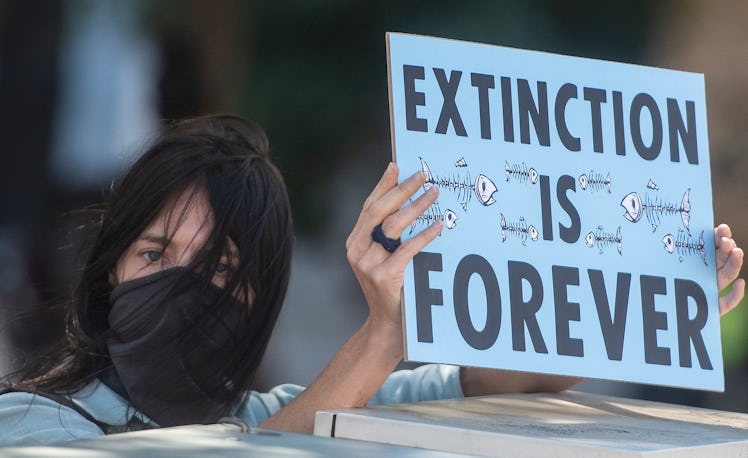
We're *Really* Running Out Of Time On Climate Change, According To New U.N. Report
Humanity is down to less than a decade.
Floods, droughts, wildfires, mass extinction, extreme weather events, ecosystem collapse — people all over the world are witnessing the effects of climate change unfold in real time. While there’s still a window in which to prevent the most severe consequences of global warming, a new report from the Intergovernmental Panel on Climate Change (IPCC) says humanity is quickly approaching worst-case scenario status. This fast-burning crisis is clearly urgent: The climate change deadline is creeping up, the IPCC report warns, and humanity is really running out of time to act.
According to the IPCC report, which was released on April 4, unless industrialized nations work to drastically reduce their emissions from coal, oil, and natural gas by 43% within eight years — by 2030 — or limiting global warming to 1.5 degrees Celsius will likely be out of reach. If humanity misses the window, sea level rise and extreme weather events will likely intensify to the point of making many places on earth uninhabitable for both humans and wildlife. Since the 19th century, humans have burned enough fossil fuels to heat the planet by roughly 1.1 degrees Celsius, according to NASA.
While the IPCC report calls for dramatic change, current government policies fall almost embarrassingly short: According to the United States Energy Information Administration, fossil fuel production in America is expected to “reach new heights” in 2023, after a small dip in 2020 amid the coronavirus pandemic. This slow, and even backwards, movement is largely attributable to a lack of political will to address climate change: political polarization means that many Republican officials still refuse to believe in the science behind climate change, according to The Brookings Institute, despite the scientific community’s consensus.
Advocates for climate action are calling the report a wake-up call. “We are at a crossroads right now,” Varshini Prakash, the executive director of climate advocacy group Sunrise Movement, said in an April 4 statement. “The science of the IPCC report is clear: fossil fuels are to blame for the climate crisis, and our government’s continued support for fossil fuels at home and abroad is killing us.”
Climate change is largely an institutional problem, with just 100 companies responsible for over 70% of greenhouse gas emissions since 1988, per a 2017 report from the Carbon Disclosure Project (CDP). Unsurprisingly, the top 10 emitters were found to be fossil-fuel based energy corporations with a ton of political pull in the United States. Meanwhile, according to a 2019 report from researchers at George Mason, Harvard University, and the University of Bristol, “the fossil fuel industry has known about the reality of human-caused climate change for decades. Its response was to actively orchestrate and fund denial and disinformation so as to stifle action and protect its status quo business operations.” The report compared the tactics used by fossil fuel corporations to those used by the tobacco industry — “cherry picking, fake experts, and conspiracy theories” — to delay or altogether halt political action.
But institutional problem or not, if you’re worried about the existential fate of the world you can still take individual action, like contacting your elected representatives and pushing them to step up on climate issues. There’s not much time left, but there’s still some time.
This article was originally published on